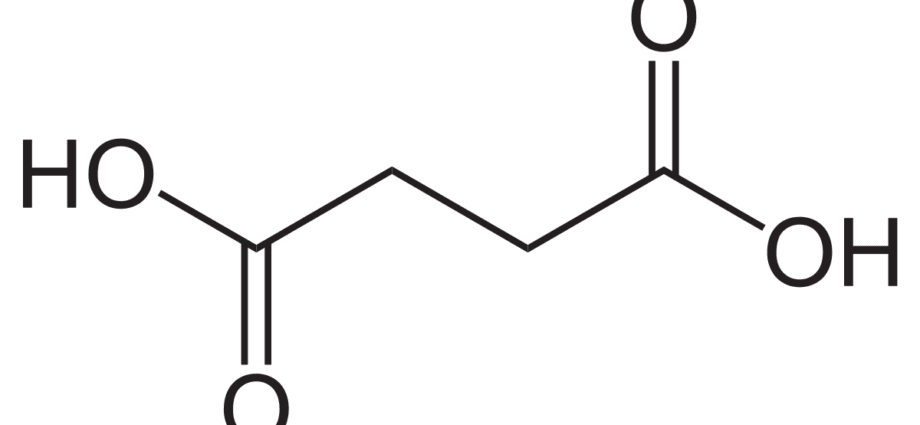Contents
Amber. Like a drop of the sun in the palm of your hand. Natural amber has long been famous for its medicinal properties. To heal the body, people wore it as jewelry, applied it to the diseased organ, and used it as a powder inside. Later it became known that our body independently produces a similar substance, and it is simply irreplaceable for it.
According to the statistics of search engines, succinic acid is very popular among the people today. It turns out that it cleanses the body, contributes to the acquisition of a beautiful and slender figure, stimulates the immune system and reduces fatigue. Naturally, these are not all of its advantages. Succinic acid has a number of other equally useful and important properties, which in our age of technological progress and haste are very helpful in maintaining the tone and health of the body.
Foods rich in succinic acid:
General characteristics of succinic acid
Succinic acid belongs to the class of organic acids. Under favorable conditions, it is produced by the body independently and in the right amount. Succinic acid is a transparent whitish powder that tastes like citric acid.
Succinic acid is found naturally in many foods. At the enterprises, the acid is produced from natural amber. The hypothalamus and adrenal glands have a special effect on the functioning of succinic acid in the body. In the body, succinic acid is presented in the form of succinates – salts of succinic acid.
Daily requirement for succinic acid
In order to determine the required amount of acid, which should be consumed daily, you need to use the following formula: 0,03 gr. * body weight of the person for whom the calculation is carried out. The resulting product will be called the daily rate of succinic acid.
The need for succinic acid increases:
- with weakened immunity;
- overweight;
- skin problem (inflammation, acne);
- with a decrease in brain activity;
- for the treatment of chronic fatigue syndrome (CFS);
- in old age, when the body’s ability to replenish the level of succinic acid decreases on its own;
- with diabetes mellitus.
The need for succinic acid decreases:
- with individual acid intolerance associated with allergic reactions;
- hypertension;
- urolithiasis;
- duodenal ulcer;
- increased acidity of gastric juice;
- glaucoma (increased intraocular pressure);
- coronary heart disease.
Assimilation of succinic acid
Succinic acid is well absorbed by the body without accumulating in organs and tissues. Moreover, it is not addictive and tastes good. The most complete assimilation of succinic acid by the body is achieved by organizing the correct daily regimen, good nutrition and optimal physical activity. It is the complex effect of such factors on the body that leads to the maximum assimilation of acid.
Useful properties of succinic acid and its effect on the body
Succinic acid helps to increase the body’s defenses, stimulating regeneration processes. It lowers blood sugar levels to the required level. Succinic acid also restores the optimal acid-base balance in the body.
That is why, with a sufficient level of succinic acid in the blood (about 40 μM), an increase in working capacity is observed, lightness and vigor after sleep is noted, the nervous system is strengthened, and stress resistance increases.
Thanks to succinic acid, the working capacity of the brain is restored, the body’s endurance increases, and the male potential grows. The acceleration of metabolism and cleansing of the body from toxins also occurs thanks to succinic acid. In addition, it contributes to weight loss.
Interaction with other elements
Succinic acid interacts well with other organic acids such as malic, pyruvic and acetic. In addition, it has the ability to convert to malic acid and vice versa. Vitamins and trace elements enhance the effect of succinic acid on the body and bring additional benefits to the body.
Signs of a lack of succinic acid in the body
- low immunity;
- constant fatigue and weakness;
- the appearance of skin rashes;
- excess weight;
- low brain activity.
Signs of excess succinic acid in the body
- disorders of the digestive system;
- discomfort in the kidney area;
- increased sensitivity of tooth enamel.
Factors affecting the content of succinic acid in the body:
In inflammatory processes, there is a sharp decrease in the amount of free acid present in the body. Also, dietary intake affects the acid content. The consumption of alkalizing food leads to the formation of salts of succinic acid, while its content in the body increases.
Succinic acid and health
It is good when all organs work harmoniously and the body produces a sufficient amount of the substances it needs. But this, unfortunately, does not always happen. Due to various health problems, the body may not produce enough succinic acid.
In this case, various dietary supplements containing succinic acid and medicines sold in the pharmacy come to the rescue. If your doctor is ok with you and you have symptoms of a lack of acid in your body, you can start treatment.
Usually, after undergoing a course of therapy with succinic acid, the skin condition improves, the whole body is cleansed with a gradual loss of extra pounds. Vigor increases and work capacity and endurance increase.










